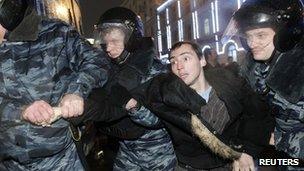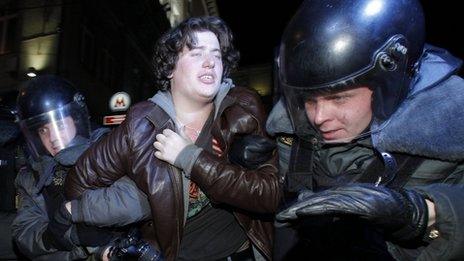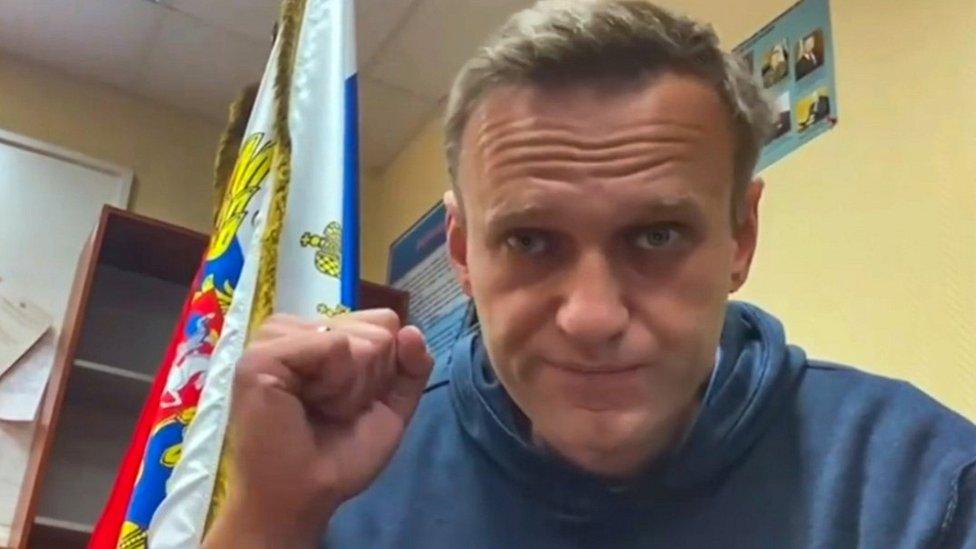Protests barely seen on Russian TV
- Published

Police have detained hundreds of protesters
Russians following the aftermath of Sunday's parliamentary election in the media could be forgiven for thinking that the country's TV stations and the press were covering different countries.
While the main national TV stations make no mention of the opposition protests, newspapers are reporting freely on the demonstrations and their violent dispersal, and several press commentators believe the political tide appears to be turning against Prime Minister Vladimir Putin and his United Russia party.
"Faith"
Tuesday's main evening bulletins on the three main national TV channels carried only low-key reports focusing entirely on the two pro-Putin rallies held in Moscow earlier in the day. On Wednesday morning they largely ignored even these stories.
One of the two state-controlled channels, Rossiya 1, broadcast a video report on the rally by United Russia's youth wing, Molodaya Gvardiya ("The Young Guard"), in central Moscow under the slogan "Clear Victory".
Noting that 10,000 had attended the event, the channel's correspondent said all the participants shared one thing - "Faith in the future of Russia".
The channel also reported a rally organised by the pro-Putin youth movements Nashi ("Our people") and Stal ("Steel") earlier in the day, but no mention was made of the opposition protesters.
The other main state channel, Channel 1 reported the same rallies in a short presenter-read piece.
"Security"
NTV, a channel controlled by the state gas monopoly Gazprom, gave a slight hint of the suppression of the opposition protest.
In its report on the pro-United Russia events, the station said that Muscovites were apparently phoning each other to wonder why army trucks had appeared in the city, but quickly reassured viewers this was only being done to ensure security at the pro-Putin rallies. It also let slip that that 51,500 security personnel were drafted into central Moscow to "ensure security".
The only channel to report the opposition protests on Tuesday night and Wednesday morning was Ren TV, a private channel regarded as Russia's sole liberal television station. Unlike the main national channels, few Russians can see it outside large urban areas.
In its lead story the channel reported that members of Nashi had arrived at the protest venue ahead of time in an attempt to disrupt the opposition demonstration, as well as covering the arrests of several opposition politicians.
"Panic"
A completely different picture emerges from Wednesday morning's papers, which paint an unfavourable picture of the authorities' handling of both the elections and the opposition protests.
In a front-page report headlined "central beating-up station" - a pun on the Russia term for "central polling station" - the respected daily Kommersant says the protests against the election results were "suppressed".
The paper accuses police of beating up protesters and journalists, and the authorities of "bussing in" Nashi supporters to confront the opposition activists.
A report headlined "Riot police disperse investors" in the tabloid Komsomolskaya Pravda says the protests in Moscow and Western condemnation had created a "genuine panic" in the currency markets and stock exchange, with the RTK share index losing nearly 5% in early trading.
"Irritation"
Some commentators believe the protests and United Russia's relatively poor showing at the election result mark a radical change in Russian politics.
"We will never be the same again," says the headline of an article by Leonid Grozman in the liberal Novaya Gazeta.
Saying United Russia had effectively lost a referendum on Mr Putin, Mr Grozman adds the election result "strikes at the very foundation of the current system".
"A revolution may be prevented only by means of major political reforms", including the dissolution of the just-elected parliament, he adds.
Accusing the Kremlin of "obstructing the real political process and building cardboard sets instead of it", an editorial in the business paper Vedomosti says the ruling "tandem" of Mr Putin and Mr Medvedev has landed "in the frying pan".
"Holding up a natural process is dangerous, and now the day of reckoning has come," the paper adds, and warns that the only way forward is to "abandon attempts at manipulation" and start "an honest dialogue between the authorities and society".
In its report on the unrest in Moscow, the heavyweight daily Nezavisimaya Gazeta speaks of "an Egyptian scenario".
''The middle class has begun expressing its irritation, and this is a very alarming signal for the authorities," political scientist Alexei Makarkin tells the paper. "The legitimacy of the State Duma elected on 4 December looks extremely weak to people who did not vote for United Russia."
An editorial in the same paper notes that Russian celebrities appear to have stopped professing their support for United Russia, in perhaps another ominous sign for the ruling party.
BBC Monitoring, external selects and translates news from radio, television, press, news agencies and the internet from 150 countries in more than 70 languages. It is based in Caversham, UK, and has several bureaux abroad.
- Published6 December 2011

- Published16 February 2024
